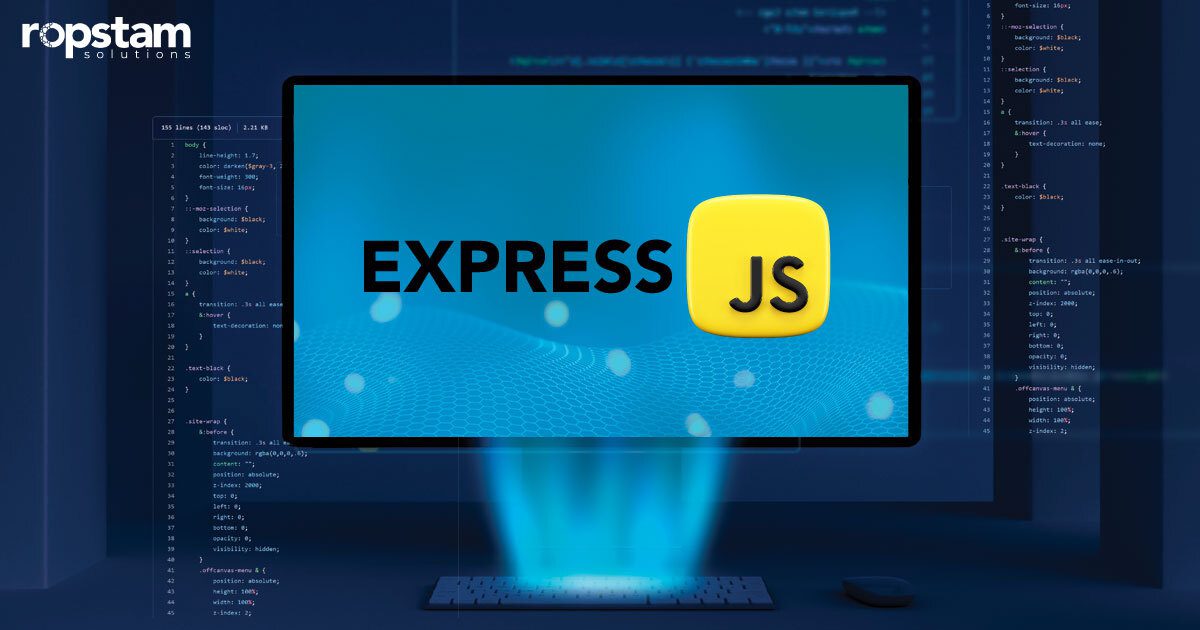Released in 2010, Express.js is a highly popular framework responsible for creating APIs for both web and mobile applications. When it comes to crafting compelling backends, Express is the preferred choice of countless developers.
Despite offering an array of advantages, Express.js has some limitations that prompt developers to look for alternatives. Whether you are a business owner or developer, if you are seeking Express.js alternatives, keep on reading.
Best Express.js alternatives for web developers to consider
In the ever-evolving domain of backend powerhouses, there are numerous alternatives to Express.js you can utilize:
- Kotlin
- Nest.js
- Fastify
- Hapi.js
- ASP.NET
- Java
- Ruby on Rails
- FeatherJS
- Swift
- Julia
- Crystal
- Purescript
1. Kotlin
Kotlin is a versatile and statically typed language that runs on the JVM. It is an excellent server-side alternative to Express.js, thanks to its concise syntax, interoperability with Java, and strong community support. Moreover, Kotlin speeds up development by reducing the amount of boilerplate code.
Benefits
- Concise code
- Null safety
- Facile Java integration
Key features
- Interoperable with Java
- Concise syntax
- Null-safety features
- Extension functions
- Great tooling support
2. Nest.js
Nest.js is a progressive Node.js framework for building efficient and scalable server-side applications. With TypeScript at its core, Nest.js brings a level of type safety and modern language features, along with a modular system that promotes reusability and maintainability.
Benefits
- Type safety
- Modular structure
- Angular-like experience
Key features
- Leverages TypeScript
- Modular architecture
- Extensive libraries
- Angular-like structure
- Easy to maintain
3. Fastify
Fastify is designed to be a faster alternative to Express.js with a focus on performance. It provides developers with a low-overhead framework and supports JSON schema out-of-the-box, which can lead to more secure and robust applications.
Benefits
- High-speed performance
- Easy JSON schema validation
Key features
- High performance
- Schema-based validation
- Plugin ecosystem
- Quick setup
- Asynchronous support
4. Hapi.js
Hapi.js offers a powerful framework for application and services development with a focus on configuration over code. It has a rich set of features for building scalable applications and boasts a strong plugin system.
Benefits
- Configuration-first approach
- Robust plugin system
Key features
- Rich plugin architecture
- Built-in input validation
- Caching capabilities
- Configuration-centric design
- Detailed API documentation
5. ASP.NET
ASP.NET is a well-established framework from Microsoft for building dynamic web applications. It integrates seamlessly with the .NET ecosystem, offering developers a comprehensive suite of tools for building robust, enterprise-level applications.
Benefits
- Performance
- Extensive .NET library support
Key Features
- High performance
- .NET ecosystem integration
- Strong security features
- Rich development tools
- Supports MVC & Web API
6. Java
Java’s vast ecosystem and strong community support make it a reliable option for web development. Not to mention that Java frameworks like Spring and Spark provide robust alternatives to Express.js for developers looking for a strongly typed, object-oriented programming language.
Benefits
- Cross-platform support
- A wide range of mature frameworks
Key features
- Strongly typed language
- Massive ecosystem
- Cross-platform capabilities
- Multithreading support
- Mature libraries
7. Ruby on Rails
Ruby on Rails, a full-stack framework, is known for its ‘convention over configuration’ philosophy. It allows developers to build applications quickly with its opinionated approach to development, making it a favorite for startups and fast-paced environments.
Benefits
- Rapid development
- Strong conventions for faster project completion
Key features
- Convention over configuration
- Rapid development cycle
- Active Record ORM
- RESTful design
- Rich libraries
8. FeatherJS
A full-stack framework for web development, Feather.js is designed to build lightweight real-time applications and RESTful services. Its flexibility makes it a suitable option for projects that require real-time capabilities and simplistic integration with other technologies.
Benefits
- Simplified real-time functionality
- Service-oriented design
Key features
- Real-time capabilities
- Flexible and extensible
- Easy authentication
- RESTful by default
- Works with any database
9. Swift
Swift is not just for iOS; with frameworks like Vapor, it can be used on the server side as well. It’s a popular language known for its modern, safe, and fast features, making it an intriguing option for web development on the server side.
Benefits
- Modern syntax with a focus on safety and performance
Key features
- Compiled language
- Modern syntax
- Memory safety
- Interoperable with Objective-C
- Server-side Swift ecosystem
10. Julia
Julia enables you to combine the ease of use of languages like Python with the performance of C, making it a strong candidate for tasks requiring high computational power. Additionally, it’s also making strides in web development with growing framework support.
Benefits
- Excellent computational performance
- An easy-to-learn language
Key features
- High performance
- Easy to learn syntax
- Dynamic typing
- Suitable for scientific computing
- Growing web framework support
11. Crystal
Crystal is a language that is as elegant as Ruby and as efficient as C. It’s a compelling choice when performance is a priority without sacrificing developer happiness.
Benefits
- Efficient performance with a syntax that is pleasant to work with
Key features
- Ruby-like syntax
- Compiled language
- Static type checking with type inference
- C-binding capabilities
- Concurrency support
12. Purescript
Purescript offers a strongly typed functional programming approach that compiles with JavaScript. It’s considered ideal for developers looking for type safety and functional programming concepts in their full-stack applications.
Benefits
- Type safety and functional programming for JavaScript environments
Key features
- Strongly typed
- Functional programming paradigm
- Interoperates with JavaScript
- Extensive tooling
- Emphasizes safety and expressivity
Why choose Express.js alternatives for web development?
While Express.js is a popular choice for building web applications due to its simplicity and flexibility, there are several reasons why developers might look for alternatives. Below, we underline why choosing an ideal Express.js alternative can be beneficial for your projects.
1. Enhanced performance
One of the primary reasons to consider an alternative to Express.js is the potential for enhanced performance. Frameworks like Fastify and Kotlin are designed with performance in mind, often providing faster response times and lower overhead, which can be crucial for high-traffic applications.
2. Stronger type safety
TypeScript-based frameworks such as Nest.js offer the advantage of stronger type safety, reducing runtime errors, and improving maintainability. This can be particularly beneficial in larger projects or teams where code clarity and error prevention are critical.
3. Richer feature sets
Alternatives like ASP.NET and Ruby on Rails come with extensive libraries and built-in features, potentially reducing development time. They offer comprehensive solutions out of the box, such as authentication, database integration, and more complex data handling, which might require additional setup in Express.js.
4. Better suitability for specific tasks
Some projects may require specific functionality that is better served by a specialized framework. For instance, FeatherJS is optimized for real-time applications, while Julia is excellent for computational-intensive tasks. Choosing the right tool for the job can lead to more efficient development and better outcomes.
5. Improved scalability
It is pertinent to mention that frameworks like Java/Spring and Hapi.js are known for their robustness and scalability. If you’re planning to build a large-scale application that needs to handle a significant amount of traffic and data, these alternatives might offer better scalability options than Express.js.
6. Modern language features
Alternatives such as Swift and Purescript bring modern language features and paradigms to server-side development. This can lead to more expressive, concise code, and leverage advancements in language design for better performance and developer productivity.
Criteria for choosing the ideal Express.js alternatives
Choosing the right framework or language for your web development project involves careful consideration of various criteria. When evaluating the most suitable Express.js alternative, it’s essential to consider several key factors that will influence the success and maintainability of your application. Here’s what to look for:
1. Performance
Performance is more often than not at the top of the list when selecting a web framework. An alternative that offers faster request handling, lower latency, or better resource management can significantly improve the user experience.
This means solutions like Kotlin and Fastify, which are known for their high-performance capabilities, are crucial for applications that demand speed and efficiency.
2. Ease of use
The ease with which you can learn and use a framework will affect your development speed and overall productivity. An alternative with a gentle learning curve, clear documentation, and a straightforward setup process can be a game-changer. Frameworks like Ruby on Rails and FeatherJS, which offer convention over configuration, are known for their developer-friendly approach.
3. Community support
Not everything will go smoothly in the development phase, and that’s when you need the help of fellow developers in this field. A strong community provides a wealth of resources, including tutorials, forums, and third-party tools, which can be invaluable for both new and experienced developers.
When a large community backs a framework, it’s easier to find solutions to problems and keep up with best practices. Nest.js and Hapi.js, for instance, boast vibrant communities that contribute to their ecosystems.
4. Scalability
As your application grows, it’s imperative that the framework you choose can scale to meet increasing demand. A framework that supports horizontal scaling, efficient load balancing, and microservices architecture can ensure your app performs well under stress. Java/Spring and ASP.NET are examples of frameworks designed with scalability in mind.
5. Features and capabilities
The built-in features and capabilities of a framework can greatly reduce development time. Look for features such as real-time processing, ORM, authentication, and session management, which can vary widely among frameworks. Assess which features are most important for your project and choose a framework that excels in those areas.
6. Learning curve
While seeking Express.js alternatives, you must consider the time investment required to become proficient in a new framework. Some frameworks have steeper learning curves due to complex concepts or less intuitive syntax. Purescript, for example, might require more time to master due to its functional programming paradigm, but it offers benefits like type safety and expressivity that might be worth the investment.
Choose Ropstam Solutions for web app development
While Express.js is a widely used framework for building dynamic web applications with Node.js, the ever-evolving field of software development offers a variety of alternatives. Each alternative brings unique benefits and trade-offs, making them potentially more suited to specific project needs.
This blog has outlined some of the robust options available to developers for backend development, offering insights into how they may serve as the best Express.js alternative for your next project.
Choosing the most suitable team of developers is the key to unlocking the secret of web development success. At Ropstam Solutions, we have a dedicated team of web application developers who are well-versed in Express.js development. With years of experience in this field and a portfolio of successfully completed projects, we have a unique distinction in the region. Get in touch with us today and turn your vision into reality.















